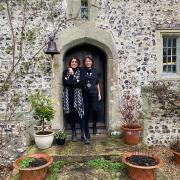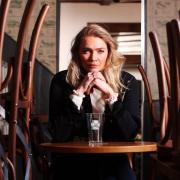For Steyning grandmother Gay Cossins, eco-awareness is a way of life. For those of us considering participating in Go Green Week this February, here are her tips...

The days may be getting longer, but it’s still chilly out there – and given the hikes in energy prices, few of us are looking forward to that impending end-of-winter fuel bill. The exception is glamorous grandmother Gay Cossins, who knows how to keep cosy without it costing the earth.
Incredibly, Gay, who will turn 70 in June, pays just £7.50 a week for electricity and gas, and £6 a week for water, but she doesn’t have to turn up the central heating or huddle in a blanket to keep warm. “Even when it’s icy, the upstairs can get too hot and I have to open a window,” she says.
The former special-needs teacher bought her Steyning bungalow six years ago and, using her eco-wits, transformed it into a beautiful green home.
Opening up the roof to create two more bedrooms and an upstairs bathroom, she installed a chunky wood-burning stove in the middle of the semi-open plan lounge and kitchen, winding its shiny, chrome chimney up through the centre of the house and out of the roof.
“It gets as hot as a very hot radiator and I never have to put the central heating on,” says Gay. “I can even cook on top of the woodburner because it’s got a flat top, which I discovered by accident when I put a pot of porridge on it. It’s like a mini Aga.”
She also insulated the concrete floors with a layer of polystyrene, using lambswool to trap heat in the roof. “Lambswool is much more efficient than foam insulation and it isn’t full of all those irritants,” says Gay. “At £700, the price worked out the same too.”
Gay replaced all the windows with 6mm double glazing, and has built a small conservatory and enclosed porch around both the back and the front door. “The sun beats down and heats them up, which helps to warm the house. They also act as an insulating cushion, stopping warm air from seeping out through the doors,” she says.
She looked into installing solar panels to provide electricity, but the benefits just didn’t weigh up. “It would cost £9,000 to install and would take 30 years to pay for itself. By that time, I’ll be dead. I’m just really careful.”
The price of wood has gone up, but nothing near as much as the cost of fossil fuels. Gay is better off than most because she gets her wood for free. “There’s a posh kitchen manufacturer nearby. They didn’t know what to do with all their off-cuts, so they’re happy to give them to me. I get wood from builders I know too, and one day, a load of wood just appeared on my doorstep. I used to forage for wood, but I haven’t needed to for a while.”
Gay is pretty hot on water conservation too. She collects water which runs off the roof into a purpose-built pond, and uses it to irrigate the garden via a solar-powered pump. She also uses the water to fill a 14-foot pool, which is just big enough to swim in. “I’ve got fish in there as well now, but they don’t seem to mind when I get in,” she laughs. This provides additional savings because she doesn’t have to pay the water board to deal with her water run-off.
Contrary to popular wisdom, Gay takes baths rather than showers. “A ten-minute shower can use 80 litres of water,” she says. “That’s the same as an average bath. So unless you really are in and out in a minute, which no one is, a bath is just as efficient.”
Gay used to grow most of her own food, but limits herself now to what grows easily and naturally. This includes raspberries, apples and grapes – and incredibly, ground elder, that invasive, perennial weed which is the blight of most gardeners’ lives. “The Romans brought it over here because it grows so fast. It’s a bit like spinach, but not quite as tasty. I also make coffee from dandelion roots and use the leaves in salads. Garlic comes up every year and I use nettles in soups.”
Unafraid of sell-by dates, Gay also snaps up food that’s reduced in price in the supermarket and freezes it to eat later. “Tons of food gets thrown away and there’s nothing wrong with it,” she says. “I can tell by the smell if it’s fit to eat or not.”
She also asks the baker for stale bread, which she gets for free. “I just rub a bit of water over the outside and put in in the oven for a couple of minutes. The crust goes all crispy and the inside fluffs back up. It’s like new,” she says.
Gay does own a car, but only uses it when she has heavy things to carry, otherwise using public transport, or her bike. “I’m taking an advanced driving course too,” she says. “That’s showing me how to use the gears to drive for fuel efficiency.”
Gay’s eco-credentials can’t be faulted, but she hasn’t sacrificed her sense of style. An on-trend patchwork quilt bought in a charity shop is used as a throw on a salvaged settee, delicate china tea cups bought second-hand bring a vintage air to the kitchen and in the winter, brightly coloured blankets, cheap to buy, are hung at the windows to help keep the cold out and the heat in. Gay also buys all her clothes second-hand, mostly in Steyning’s charity shops – and there’s no doubting how great she looks.
Go Green Week runs from 10 to 16 February. You can find more information at peopleandplanet.org/gogreenweek
----------------------------------------------------------
Gay’s eco tips
Use white vinegar to clean surfaces. It work on everything from windows to the kitchen worktop. It’s much cheaper that shop-bought cleaning products and doesn’t contain harsh chemicals, so is much better for the environment.
***
A dishwasher uses three or four times less than the amount of water needed to wash the same amount of dishes by hand.
***
A little bit of bicarbonate of soda is great for getting your teeth clean, and keeps you and the environment chemical-free.
***
Wash everything at 30 degrees.
***
If you get cold, put on a jumper. If that doesn’t work, jump up and down. It’ll be good for your health too.
***
Olive oil works brilliantly as a moisturiser, while a teaspoon of salt and a handful of oatmeal in the bath is great as an exfoliating and moisturising rub.
***
Forget ironing. It takes ages and uses up loads of energy. Instead tumble dry cotton and man-made fabrics for 30 seconds along with a couple of spiky dryer balls to soften creases out. Hanging clothes up in a steamy bathroom works really well too. Gay’s eco tips



























